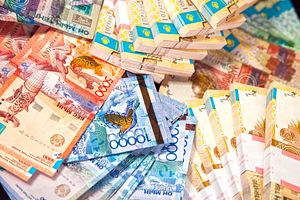It’s old news with new data. The World Bank’s recent Economic Outlook for the Europe and Central Asia (ECA) region notes that countries in the east–Central Asia and the Caucuses–have been struck hard by low oil prices, the rippling effects of Russia’s drastic economic downturn, and region-wide difficulty in recovering from the aftereffects of the 2008 global financial crisis. The update’s title says it all: Low Commodity Prices and Weak Currencies.
Speaking at the report’s launch in Astana, Cyril Muller, the World Bank’s vice president for Europe and Central Asia, said, “the eastern part of ECA is hit hard by declining commodity prices, particularly oil, while geopolitical risks and increased financial market volatility in emerging markets are dampening potential growth across all countries.”
Muller continued, saying that in order to “set the stage for robust growth” Central Asia must “adjust to the ‘new normal’ of lower oil prices with exchange rate flexibility and an agile business climate.”
While GDP growth across the entire ECA region is now expected to increase to 1.4 percent for 2015–that number belies a deeper divergence between the region’s western and eastern parts. According to the report, while the European Union will continue to experience a slow but steady recovery (1.9 percent GDP growth in 2015), Eastern Europe and Central Asia will likely experience a contraction in 2015.
In Eastern Europe and Central Asia, “the 1.5 percent GDP growth in 2014 is likely to turn into a 1 percent contraction this year,” the report says. The sharp decline of Russia’s economy–the report projects a 3.8 percent contraction in 2015–tugs on the region’s other economies. And Russia’s decline is tightly linked to the drop in global oil prices.
GDP growth (or lack thereof) doesn’t tell the whole story, though it is a useful and succinct measurement of economic health. The World Bank report also looks at changes in terms-of-trade which stem from import/export prices. “The fall in the oil prices and the subsequent devaluation of the ruble caused large changes in import and export prices, and consequently large terms-of-trade losses,” the report comments. In addition, the real value of remittances–which are a key component in the GDPs of Tajikistan and Kyrgyzstan, and to a lesser extend Uzbekistan–declined sharply, “because of real depreciations in countries where the remittances originate.”
Again, this is mostly old news but the World Bank’s categorization of the circumstances as a “new normal” is a bleak, but honest assessment. “The causes of the weak environment are more of a structural than a cyclical nature,” the report comments. Central Asian states are, in some ways, coming around to facing that reality, building economic plans based on lower oil prices and switching to flexible exchange rates. Kazakhstan’s sudden switch to a free float, which triggering a sharp devaluation in the currency, may in the longer run help rebalance Astana’s economics.
Central Asia is also making strides with regard to reforms that make it easier for businesses to operate, at least as far as the World Bank’s Doing Business 2016 report, released today, is concerned. That report notes that both Kazakhstan and Uzbekistan are among the top ten economies that improved the most in 2014 and 2015, with regard to areas tracked by the report such as ease of starting a business, protecting minority investors, and enforcing contracts.
“It is commendable that almost every single economy in Europe and Central Asia implemented at least one reform in the last year to improve the business environment,” Rita Ramalho, manager of the Doing Business project commented in a press release.

































